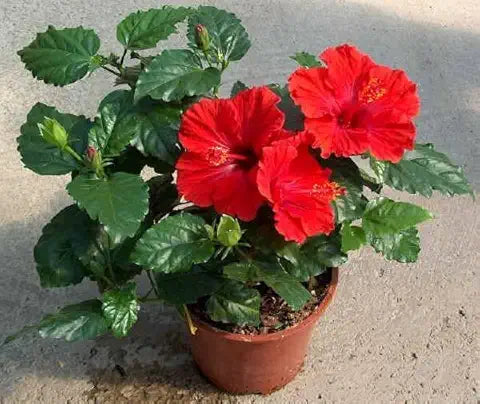Hibiscus Flower Red Easy Grow Plant Seeds
Couldn't load pickup availability
Description
Hibiscus Seeds
Characteristics and Uses of Hibiscus Plants
Hibiscus plants are renowned for their stunning, large blooms in a wide array of colors, including red, pink, yellow, and white. Known for their tropical appeal, these plants are perfect for gardens, borders, or containers, adding a splash of vibrant color. Hibiscus is a favorite among flowering plant seeds enthusiasts, known for its ability to attract bees, butterflies, and hummingbirds. These non-GMO seeds yield healthy, beautiful plants that offer striking flowers, making them ideal for ornamental use in any garden or as a potted plant for patios and balconies.
Growing Conditions for Hibiscus Plants
- Light Requirements: Hibiscus thrives in full sun, needing at least 6 hours of direct sunlight per day.
- Temperature: This plant prefers warm temperatures between 60°F and 90°F (15°C to 32°C).
- Soil: Hibiscus plants prefer well-draining, rich, and slightly acidic to neutral soil.
- Watering: Keep the soil consistently moist, but ensure good drainage to avoid waterlogging. Overwatering can cause root rot.
Planting Tips for Hibiscus
- Seed Preparation: Soak hibiscus seeds in warm water for 12-2hours before planting to help speed up germination.
- Planting Depth: Plant seeds about 1/inch deep in moist, well-draining soil.
- Spacing: Space the plants 2-3 feet apart to allow them to grow to their full size.
- Germination Time: Hibiscus seeds typically germinate within 14-21 days, depending on environmental conditions.
Watering Instructions and Tips
Hibiscus plants require consistent moisture, particularly during the growing season. Water regularly, ensuring the soil remains moist but not soggy. Avoid waterlogging by ensuring proper drainage in pots or garden beds. Reduce watering during the dormant winter period, but keep the soil lightly moist during this time.
Growing Zones
- USDA Hardiness Zones: Hibiscus plants thrive in zones 8-.
- Global Zones: Best suited for tropical and subtropical climates, hibiscus can also be grown in Mediterranean climates with mild winters.
Key Benefits & Uses
- Non-GMO seeds: These hibiscus seeds are 100% non-GMO, ensuring you grow your plants naturally and safely.
- Vibrant Flowers: Enjoy vibrant, large blooms that are a perfect addition to any garden.
- Attracts Pollinators: Hibiscus flowers attract beneficial pollinators, such as bees and butterflies, to your garden.
- Low Maintenance: Once established, hibiscus plants are relatively easy to care for, making them ideal for both experienced and beginner gardeners.
Best Uses in the Garden & Landscape
- Ornamental Borders: Create beautiful borders or flower beds with these stunning plants.
- Container Gardens: Hibiscus is perfect for containers and can be placed on patios, decks, or balconies for a tropical touch.
- Wildlife Gardens: Hibiscus plants attract hummingbirds and butterflies, making them an excellent choice for pollinator gardens.
Conclusion
Hibiscus plants are an exceptional choice for adding color and tropical beauty to your garden. Known for their stunning flowers, ease of care, and ability to attract pollinators, they are a fantastic addition to any outdoor or indoor space. At bijaseeds, a big, trusted name in the seed world, we offer a wide range of high-quality, non-GMO hibiscus seeds for gardeners looking to cultivate these beautiful, vibrant plants.
FAQ
How do I plant hibiscus seeds?
Soak hibiscus seeds in warm water for 12-2hours to enhance germination. Plant them in well-draining soil about 1/inch deep. Keep the soil moist and place the seeds in a warm, sunny area for optimal growth.
When do hibiscus plants bloom?
Hibiscus plants generally bloom in late summer to fall, depending on the variety and growing conditions. Some plants may bloom earlier in tropical climates.
Can hibiscus be grown in containers?
Yes, hibiscus can be successfully grown in containers, making them perfect for patios, balconies, and smaller garden spaces. Ensure you use a large pot with good drainage to support their growth.





